Fleurs du Mal Magazine


Or see the index
In Parkzicht brengt Paul Bezembinder een tragische liefdesgeschiedenis.
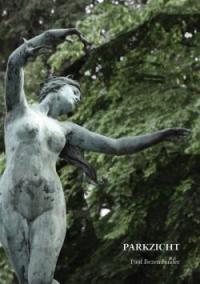 Met zijn inmiddels gevestigde combinatie van klassieke poëzie, pastiche en smartlap laveert hij moeiteloos langs de Scylla van de zoetsappigheid en de Charybdis van de chaos. Het resulteert in beelden die beklijven, die klemmen op de borst, gloeien in het hart en branden in de ziel.
Met zijn inmiddels gevestigde combinatie van klassieke poëzie, pastiche en smartlap laveert hij moeiteloos langs de Scylla van de zoetsappigheid en de Charybdis van de chaos. Het resulteert in beelden die beklijven, die klemmen op de borst, gloeien in het hart en branden in de ziel.
Waarheid of verbeelding? Ongemakkelijk blijft het. U zult na het lezen van deze bundel nooit meer dezelfde zijn.
Dichtbundels Paul Bezembinder:
Gedichten, uitg. Pittige Pixels, Amsterdam (2018).
Kwatrijnen, uitg. Art Brut Digital Editions, Tilburg (2018).
Gedichten, uitg. Leeuwenhof, Oostburg (2020).
Parkzicht, uitg. Leeuwenhof, Oostburg (2020).
Meer informatie, vertalingen en gedichten:
# website paul bezembinder
# website fleursdumal.nl magazine
Paul Bezembinder
Parkzicht
Uitgeverij Leeuwenhof, Oostburg
1 december 2020
Nederlands
Druk 1
Paperback
Afmetingen 21 x 14,8 x 0,6 cm
Aantal pagina’s: 60
ISBN 9789082541281
20,- euro
# new poetry
paul bezembinder
• fleursdumal.nl magazine
More in: - Book Lovers, - Book News, Archive A-B, Archive A-B, Bezembinder, Paul, POETRY IN TRANSLATION: BEZEMBINDER

C’est Lou
Qu’on La Nommait
Il est des loups de toute sorte
Je connais le plus inhumain
Mon cœur que le diable l’emporte
Et qu’il le dépose à sa porte
N’est plus qu’un jouet dans sa main
Les loups jadis étaient fidèles
Comme sont les petits toutous
Et les soldats amants des belles
Galamment en souvenir d’elles
Ainsi que les loups étaient doux
Mais aujourd’hui les temps sont pires
Les loups sont tigres devenus
Et les Soldats et les Empires
Les Césars devenus Vampires
Sont aussi cruels que Vénus
J’en ai pris mon parti Rouveyre
Et monté sur mon grand cheval
Je vais bientôt partir en guerre
Sans pitié chaste et l’œil sévère
Comme ces guerriers qu’Epinal
Vendait Images populaires
Que Georgin gravait dans le bois
Où sont-ils ces beaux militaires
Soldats passés Où sont les guerres
Où sont les guerres d’autrefois
Guillaume Apollinaire
(1880 – 1918)
C’est Lou Qu’on La Nommait
• fleursdumal.nl magazine
More in: Apollinaire, Guillaume, Archive A-B, Archive A-B, Guillaume Apollinaire

Op café
Aan de toog neuriën treuzelige drinkers gebruikte
melodieën, met de nonchalance van zangers
die onbang zijn als de stem van Björk. Hoor hoe ze
in hun liederen worden van huiverende ontwakers
tot dochterloze vaders, ontwaarde vertalers van
vrijpostige heiligen, gulle grensvrezers in de ochtend.
Bert Bevers
gedicht
Op café
(ongepubliceerd)
• fleursdumal.nl magazine
More in: Archive A-B, Archive A-B, Bevers, Bert
Gevatter Tod
Es lebte einmal ein sehr armer Mann, hieß Klaus, dem hatte Gott eine Fülle Reichtum beschert, der ihm große Sorge machte, nämlich zwölf Kinder, und über ein kleines so kam noch ein Kleines, das war das dreizehnte Kind. Da wußte der arme Mann seiner Sorge keinen Rat, wo er doch einen Paten hernehmen sollte, denn seine ganze Sipp- und Magschaft hatte ihm schon Kinder aus der Taufe gehoben, und er durfte nicht hoffen, noch unter seinen Freunden eine mitleidige Seele zu finden, die ihm sein jüngstgebornes Kindlein hebe. Gedachte also an den ersten besten wildfremden Menschen sich zu wenden, zumal manche seiner Bekannten ihn in ähnlichen Fällen schon mit vieler Hartherzigkeit abschläglich beschieden hatten.
Der arme Kindesvater ging also auf die Landstraße hinaus, willens, dem ersten ihm Begegnenden die Patenstelle seines Kindleins anzutragen. Und siehe, ihm begegnete bald ein gar freundlicher Mann, stattlichen Aussehens, wohlgestaltet, nicht alt nicht jung, mild und gütig von Angesicht, und da kam es dem Armen vor, als neigten sich vor jenem Manne die Bäume und Blümlein und alle Gras- und Getreidehalme. Da dünkte dem Klaus, das müsse der liebe Gott sein, nahm seine schlechte Mütze ab, faltete die Hände und betete ein Vater Unser. Und es war auch der liebe Gott, der wußte, was Klaus wollte, ehe er noch bat, und sprach: »Du suchst einen Paten für dein Kindlein! Wohlan, ich will es dir heben, ich, der liebe Gott!«
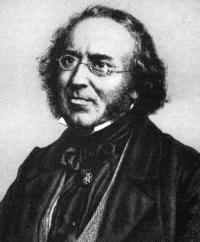 »Du bist allzugütig, lieber Gott!« antwortete Klaus verzagt. »Aber ich danke dir; du gibst denen, welche haben, einem Güter, dem andern Kinder, so fehlt es oft beiden am Besten, und der Reiche schwelgt, der Arme hungert!« Auf diese Rede wandte sich der Herr und ward nicht mehr gesehen. Klaus ging weiter, und wie er eine Strecke gegangen war, kam ein Kerl auf ihn zu, der sah nicht nur aus, wie der Teufel, sondern war’s auch, und fragte Klaus, wen er suche? – Er suche einen Paten für sein Kindlein. – »Ei da nimm mich, ich mach es reich!« – »Wer bist du!« fragte Klaus. »Ich bin der Teufel« – »Das wär der Teufel!« rief Klaus, und maß den Mann vom Horn bis zum Pferdefuß. Dann sagte er: »Mit Verlaub, geh heim zu dir und zu deiner Großmutter; dich mag ich nicht zum Gevatter, du bist der Allerböseste! Gott sei bei uns!«
»Du bist allzugütig, lieber Gott!« antwortete Klaus verzagt. »Aber ich danke dir; du gibst denen, welche haben, einem Güter, dem andern Kinder, so fehlt es oft beiden am Besten, und der Reiche schwelgt, der Arme hungert!« Auf diese Rede wandte sich der Herr und ward nicht mehr gesehen. Klaus ging weiter, und wie er eine Strecke gegangen war, kam ein Kerl auf ihn zu, der sah nicht nur aus, wie der Teufel, sondern war’s auch, und fragte Klaus, wen er suche? – Er suche einen Paten für sein Kindlein. – »Ei da nimm mich, ich mach es reich!« – »Wer bist du!« fragte Klaus. »Ich bin der Teufel« – »Das wär der Teufel!« rief Klaus, und maß den Mann vom Horn bis zum Pferdefuß. Dann sagte er: »Mit Verlaub, geh heim zu dir und zu deiner Großmutter; dich mag ich nicht zum Gevatter, du bist der Allerböseste! Gott sei bei uns!«
Da drehte sich der Teufel herum, zeigte dem Klaus eine abscheuliche Fratze, füllte die Luft mit Schwefelgestank und fuhr von dannen. Hierauf begegnete dem Kindesvater abermals ein Mann, der war spindeldürr, wie eine Hopfenstange, so dürr, daß er klapperte; der fragte auch: »Wen suchst du?« und bot sich zum Paten des Kindes an. »Wer bist du?« fragte Klaus. »Ich bin der Tod!« sprach jener mit ganz heiserer Summe. – Da war der Klaus zum Tod erschrocken, doch faßte er sich Mut, dachte: bei dem wär mein dreizehntes Söhnlein am besten aufgehoben, und sprach: »du bist der Rechte! Arm oder reich, du machst es gleich. Topp! Du sollst mein Gevattersmann sein! Stell dich nur ein zu rechter Zeit, am Sonntag soll die Taufe sein.«
Und am Sonntag kam richtig der Tod, und ward ein ordentlicher Dot, das ist Taufpat des Kleinen, und der Junge wuchs und gedieh ganz fröhlich. Als er nun zu den Jahren gekommen war, wo der Mensch etwas erlernen muß, daß er künftighin sein Brot erwerbe, kam zu der Zeit der Pate und hieß ihn mit sich gehen in einen finsteren Wald. Da standen allerlei Kräuter, und der Tod sprach: »Jetzt, mein Pat, sollt du dein Patengeschenk von mir empfahen. Du sollt ein Doktor über alle Doktoren werden durch das rechte wahre Heilkraut, das ich dir jetzt in die Hand gebe. Doch merke, was ich dir sage. Wenn man dich zu einem Kranken beruft, so wirst du meine Gestalt jedesmal erblicken.
Stehe ich zu Häupten des Kranken, so darfst du versichern, daß du ihn gesund machen wollest, und ihn von dem Kraute eingeben; wenn er aber Erde kauen muß, so stehe ich zu des Kranken Füßen; dann sage nur: Hier kann kein Arzt der Welt helfen und auch ich nicht. Und brauche ja nicht das Heilkraut gegen meinen mächtigen Willen, so würde es dir übel ergehen!«
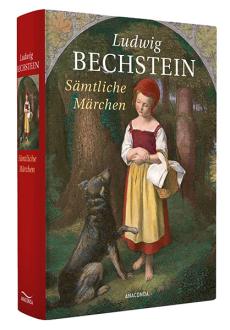 Damit ging der Tod von hinnen und der junge Mensch auf die Wanderung und es dauerte gar nicht lange, so ging der Ruf vor ihm her und der Ruhm, dieser sei der größte Arzt auf Erden, denn er sahe es gleich den Kranken an, ob sie leben oder sterben würden. Und so war es auch. Wenn dieser Arzt den Tod zu des Kranken Füßen erblickte, so seufzte er, und sprach ein Gebet für die Seele des Abscheidenden; erblickte er aber des Todes Gestalt zu Häupten, so gab er ihm einige Tropfen, die er aus dem Heilkraut preßte, und die Kranken genasen. Da mehrte sich sein Ruhm von Tage zu Tage.
Damit ging der Tod von hinnen und der junge Mensch auf die Wanderung und es dauerte gar nicht lange, so ging der Ruf vor ihm her und der Ruhm, dieser sei der größte Arzt auf Erden, denn er sahe es gleich den Kranken an, ob sie leben oder sterben würden. Und so war es auch. Wenn dieser Arzt den Tod zu des Kranken Füßen erblickte, so seufzte er, und sprach ein Gebet für die Seele des Abscheidenden; erblickte er aber des Todes Gestalt zu Häupten, so gab er ihm einige Tropfen, die er aus dem Heilkraut preßte, und die Kranken genasen. Da mehrte sich sein Ruhm von Tage zu Tage.
Nun geschah es, daß der Wunderarzt in ein Land kam, dessen König schwer erkrankt darnieder lag, und die Hofärzte gaben keine Hoffnung mehr seines Aufkommens. Weil aber die Könige am wenigsten gern sterben, so hoffte der alte König noch ein Wunder zu erleben, nämlich daß der Wunderdoktor ihn gesund mache, ließ diesen berufen und versprach ihm den höchsten Lohn. Der König hatte aber eine Tochter, die war so schön und so gut, wie ein Engel.
Als der Arzt in das Gemach des Königs kam, sah er zwei Gestalten an dessen Lager stehen, zu Häupten die schöne weinende Königstochter, und zu Füßen den kalten Tod. Und die Königstochter flehte ihn so rührend an, den geliebten Vater zu retten, aber die Gestalt des finstern Paten wich und wankte nicht. Da sann der Doktor auf eine List. Er ließ von raschen Dienern das Bette des Königs schnell umdrehen, und gab ihm geschwind einen Tropfen vom Heilkraut, also daß der Tod betrogen war, und der König gerettet. Der Tod wich erzürnt von hinnen, erhob aber drohend den langen knöchernen Zeigefinger gegen seinen Paten.
Dieser war in Liebe entbrannt gegen die reizende Königstochter, und sie schenkte ihm ihr Herz aus inniger Dankbarkeit. Aber bald darauf erkrankte sie schwer und heftig, und der König, der sie über alles liebte, ließ bekannt machen, welcher Arzt sie gesund mache, der solle ihr Gemahl und hernach König werden. Da flammte eine hohe Hoffnung durch des Jünglings Herz, und er eilte zu der Kranken – aber zu ihren Füßen stand der Tod. Vergebens warf der Arzt seinem Paten flehende Blicke zu, daß er seine Stelle verändern und ein wenig weiter hinauf, wo möglich bis zu Häupten der Kranken treten möge. Der Tod wich nicht von der Stelle, und die Kranke schien im Verscheiden, doch sah sie den Jüngling um ihr Leben flehend an. Da übte des Todes Pate noch einmal seine List, ließ das Lager der Königstochter schnell umdrehen, und gab ihr geschwind einige Tropfen vom Heilkraut, so daß sie wieder auflebte, und den Geliebten dankbar anlächelte. Aber der Tod warf seinen tödlichen Haß auf den Jüngling, faßte ihn an mit eiserner eiskalter Hand und führte ihn von dannen, in eine weite unterirdische Höhle. In der Höhle da brannten viele tausend Kerzen, große und halbgroße und kleine und ganz kleine; viele verloschen und andere entzündeten sich, und der Tod sprach zu seinem Paten: »Siehe, hier brennt eines jeden Menschen Lebenslicht; die großen sind den Kindern, die halbgroßen sind den Leuten, die in den besten Jahren stehen, die kleinen den Alten und Greisen, aber auch Kinder und Junge haben oft nur ein kleines bald verlöschendes Lebenslicht.«
»Zeige mir doch das meine!« bat der Arzt den Tod, da zeigte dieser auf ein ganz kleines Stümpchen, das bald zu erlöschen drohte. »Ach liebster Pate!« bat der Jüngling: »wolle mir es doch erneuen, damit ich meine schöne Braut, die Königstochter, freien, ihr Gemahl und König werden kann!« – »Das geht nicht« – versetzte kalt der Tod. »Erst muß eins ganz ausbrennen, ehe ein neues auf- und angesteckt wird.« –
»So setze doch gleich das alte auf ein neues!« sprach der Arzt – und der Tod sprach: »Ich will so tun!« Nahm ein langes Licht, tat als wollte er es aufstecken, versah es aber absichtlich und stieß das kleine um, daß es erlosch. In demselben Augenblick sank der Arzt um und war tot.
Ludwig Bechstein
(1801 – 1860)
Gevatter Tod
Sämtliche Märchen
• fleursdumal.nl magazine
More in: Archive A-B, Bechstein, Bechstein, Ludwig, Tales of Mystery & Imagination

Brexit blues
Voor hetere vuren hadden ze gestaan, met
geloken blikken vol mist op verre zeevaart.
Ze dachten grage menners wel te herkennen,
en hun beduimelde beloften ras te doorzien.
Nu wachten de weglopers ginds achter breed
water bang af wat komt, in hun andere uren.
Bert Bevers
gedicht
Brexit blues
(ongepubliceerd)
• fleursdumal.nl magazine
More in: Archive A-B, Archive A-B, Bevers, Bert, MONTAIGNE
Three and One are One
In the year 1861 Barr Lassiter, a young man of twenty-two, lived with his parents and an elder sister near Carthage, Tennessee. The family were in somewhat humble circumstances, subsisting by cultivation of a small and not very fertile plantation. Owning no slaves, they were not rated among “the best people” of their neighborhood; but they were honest persons of good education, fairly well mannered and as respectable as any family could be if uncredentialed by personal dominion over the sons and daughters of Ham.
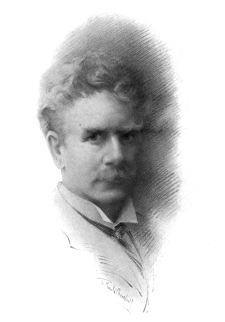 The elder Lassiter had that severity of manner that so frequently affirms an uncompromising devotion to duty, and conceals a warm and affectionate disposition. He was of the iron of which martyrs are made, but in the heart of the matrix had lurked a nobler metal, fusible at a milder heat, yet never coloring nor softening the hard exterior. By both heredity and environment something of the man’s inflexible character had touched the other members of the family; the Lassiter home, though not devoid of domestic affection, was a veritable citadel of duty, and duty—ah, duty is as cruel as death!
The elder Lassiter had that severity of manner that so frequently affirms an uncompromising devotion to duty, and conceals a warm and affectionate disposition. He was of the iron of which martyrs are made, but in the heart of the matrix had lurked a nobler metal, fusible at a milder heat, yet never coloring nor softening the hard exterior. By both heredity and environment something of the man’s inflexible character had touched the other members of the family; the Lassiter home, though not devoid of domestic affection, was a veritable citadel of duty, and duty—ah, duty is as cruel as death!
When the war came on it found in the family, as in so many others in that State, a divided sentiment; the young man was loyal to the Union, the others savagely hostile. This unhappy division begot an insupportable domestic bitterness, and when the offending son and brother left home with the avowed purpose of joining the Federal army not a hand was laid in his, not a word of farewell was spoken, not a good wish followed him out into the world whither he went to meet with such spirit as he might whatever fate awaited him.
Making his way to Nashville, already occupied by the Army of General Buell, he enlisted in the first organization that he found, a Kentucky regiment of cavalry, and in due time passed through all the stages of military evolution from raw recruit to experienced trooper. A right good trooper he was, too, although in his oral narrative from which this tale is made there was no mention of that; the fact was learned from his surviving comrades. For Barr Lassiter has answered “Here” to the sergeant whose name is Death.
Two years after he had joined it his regiment passed through the region whence he had come. The country thereabout had suffered severely from the ravages of war, having been occupied alternately (and simultaneously) by the belligerent forces, and a sanguinary struggle had occured in the immediate vicinity of the Lassiter homestead. But of this the young trooper was not aware.
Finding himself in camp near his home, he felt a natural longing to see his parents and sister, hoping that in them, as in him, the unnatural animosities of the period had been softened by time and separation. Obtaining a leave of absence, he set foot in the late summer afternoon, and soon after the rising of the full moon was walking up the gravel path leading to the dwelling in which he had been born.
Soldiers in war age rapidly, and in youth two years are a long time. Barr Lassiter felt himself an old man, and had almost expected to find the place a ruin and a desolation. Nothing, apparently, was changed. At the sight of each dear and familiar object he was profoundly affected. His heart beat audibly, his emotion nearly suffocated him; an ache was in his throat. Unconsciously he quickened his pace until he almost ran, his long shadow making grotesque efforts to keep its place beside him.
The house was unlighted, the door open. As he approached and paused to recover control of himself his father came out and stood bare-headed in the moonlight.
“Father!” cried the young man, springing forward with outstretched hand—“Father!”
The elder man looked him sternly in the face, stood a moment motionless and without a word withdrew into the house. Bitterly disappointed, humiliated, inexpressibly hurt and altogether unnerved, the soldier dropped upon a rustic seat in deep dejection, supporting his head upon his trembling hand. But he would not have it so: he was too good a soldier to accept repulse as defeat. He rose and entered the house, passing directly to the “sitting-room.”
It was dimly lighted by an uncurtained east window. On a low stool by the hearthside, the only article of furniture in the place, sat his mother, staring into a fireplace strewn with blackened embers and cold ashes. He spoke to her—tenderly, interrogatively, and with hesitation, but she neither answered, nor moved, nor seemed in any way surprised. True, there had been time for her husband to apprise her of their guilty son’s return. He moved nearer and was about to lay his hand upon her arm, when his sister entered from an adjoining room, looked him full in the face, passed him without a sign of recognition and left the room by a door that was partly behind him. He had turned his head to watch her, but when she was gone his eyes again sought his mother. She too had left the place.
Barr Lassiter strode to the door by which he had entered. The moonlight on the lawn was tremulous, as if the sward were a rippling sea. The trees and their black shadows shook as in a breeze. Blended with its borders, the gravel walk seemed unsteady and insecure to step on. This young soldier knew the optical illusions produced by tears. He felt them on his cheek, and saw them sparkle on the breast of his trooper’s jacket. He left the house and made his way back to camp.
The next day, with no very definite intention, with no dominant feeling that he could rightly have named, he again sought the spot. Within a half-mile of it he met Bushrod Albro, a former playfellow and schoolmate, who greeted him warmly.
“I am going to visit my home,” said the soldier.The other looked at him rather sharply, but said nothing.
“I know,” continued Lassister, “that my folks have not changed, but—”
There have been changes,” Albro interrupted—“everything changes. I’ll go with you if you don’t mind. We can talk as we go.”
But Albro did not talk.
Instead of a house they found only fire-blackened foundations of stone, enclosing an area of compact ashes pitted by rains.
Lassiter’s astonishment was extreme.
“I could not find the right way to tell you,” said Albro. “In the fight a year ago your house was burned by a Federal shell.”
“And my family—where are they?”
“In Heaven, I hope. All were killed by the shell.”
Ambrose Bierce
(1842 – 1913/1914 ?)
Three and One are One
• fleursdumal.nl magazine
More in: Archive A-B, Archive A-B, Bierce, Ambrose, Bierce, Ambrose
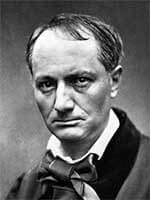
Sisina
Imaginez Diane en galant équipage,
Parcourant les forêts ou battant les halliers,
Cheveux et gorge au vent, s’enivrant de tapage,
Superbe et défiant les meilleurs cavaliers!
Avez-vous vu Théroigne, amante du carnage,
Excitant à l’assaut un peuple sans souliers,
La joue et l’oeil en feu, jouant son personnage,
Et montant, sabre au poing, les royaux escaliers?
Telle la Sisina! Mais la douce guerrière
À l’âme charitable autant que meurtrière;
Son courage, affolé de poudre et de tambours,
Devant les suppliants sait mettre bas les armes,
Et son coeur, ravagé par la flamme, a toujours,
Pour qui s’en montre digne, un réservoir de larmes.
Charles Baudelaire
(1821-1867)
Sisina
(poème)
• fleursdumal.nl magazine
More in: Archive A-B, Archive A-B, Baudelaire, Baudelaire, Charles
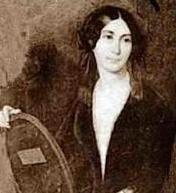
L’ange de poésie
et la jeune femme
L’ANGE DE POÉSIE.
Éveille-toi, ma sœur, je passe près de toi !
De mon sceptre divin tu vas subir la loi ;
Sur toi, du feu sacré tombent les étincelles,
Je caresse ton front de l’azur de mes ailes.
À tes doigts incertains, j’offre ma lyre d’or,
Que ton âme s’éveille et prenne son essor !…
Le printemps n’a qu’un jour, tout passe ou tout s’altère ;
Hâte-toi de cueillir les roses de la terre,
Et chantant les parfums dont s’enivrent tes sens,
Offre tes vers au ciel comme on offre l’encens !
Chante, ma jeune sœur, chante ta belle aurore,
Et révèle ton nom au monde qui l’ignore.
LA JEUNE FEMME.
Grâce !.. éloigne de moi ton souffle inspirateur !
Ne presse pas ainsi ta lyre sur mon cœur !
Dans mon humble foyer, laisse-moi le silence ;
La femme qui rougit a besoin d’ignorance.
Le laurier du poète exige trop d’effort…
J’aime le voile épais dont s’obscurcit mon sort.
Mes jours doivent glisser sur l’océan du monde,
Sans que leur cours léger laisse un sillon sur l’onde ;
Ma voix ne doit chanter que dans le sein des bois,
Sans que l’écho répète un seul son de ma voix.
L’ANGE DE POÉSIE.
Je t’appelle, ma sœur, la résistance est vaine.
Des fleurs de ma couronne, avec art je t’enchaîne :
Tu te débats en vain sous leurs flexibles nœuds.
D’un souffle dévorant j’agite tes cheveux,
Je caresse ton front de ma brûlante haleine !
Mon cœur bat sur ton cœur, ma main saisit la tienne ;
Je t’ouvre le saint temple où chantent les élus…
Le pacte est consommé, je ne te quitte plus !
Dans les vallons lointains suivant ta rêverie,
Je prêterai ma voix aux fleurs de la prairie ;
Elles murmureront : « Chante, chante la fleur
Qui ne vit qu’un seul jour pour vivre sans douleur. »
Tu m’entendras encor dans la brise incertaine
Qui dirige la barque en sa course lointaine ;
Son souffle redira : « Chante le ciel serein ;
Qu’il garde son azur, le salut du marin ! »
J’animerai l’oiseau caché sous le feuillage,
Et le flot écumant qui se brise au rivage ;
L’encens remplira l’air que tu respireras…
Et soumise à mes lois, ma sœur, tu chanteras !
LA JEUNE FEMME.
J’écouterai ta voix, ta divine harmonie,
Et tes rêves d’amour, de gloire et de génie ;
Mon âme frémira comme à l’aspect des cieux…
Des larmes de bonheur brilleront dans mes yeux.
Mais de ce saint délire, ignoré de la terre,
Laisse-moi dans mon cœur conserver le mystère ;
Sous tes longs voiles blancs, cache mon jeune front ;
C’est à toi seul, ami, que mon âme répond !
Et si, dans mon transport, m’échappe une parole,
Ne la redis qu’au Dieu qui comprend et console.
Le talent se soumet au monde, à ses décrets,
Mais un cœur attristé lui cache ses secrets ;
Qu’aurait-il à donner à la foule légère,
Qui veut qu’avec esprit on souffre pour lui plaire ?
Ma faible lyre a peur de l’éclat et du bruit,
Et comme Philomèle, elle chante la nuit.
Adieu donc ! laisse-moi ma douce rêverie,
Reprends ton vol léger vers ta belle patrie !
L’ange reste près d’elle, il sourit à ses pleurs,
Et resserre les nœuds de ses chaînes de fleurs ;
Arrachant une plume à son aile azurée,
Il la met dans la main qui s’était retirée.
En vain elle résiste, il triomphe… il sourit…
Laissant couler ses pleurs, la jeune femme écrit.
Sophie d’Arbouville
(1810-1850)
Le chant du cygne
Poésies et nouvelles (1840)
• fleursdumal.nl
More in: Arbouville, Sophie d', Archive A-B, Archive A-B

Op rust
Stappend uit de plattegrond ziet hij
de ruige snede van het leven pas
op de plaats van stilstand inzicht
zich ontvouwt. Zie hem aankuieren,
als een man die na lang geoefend te
hebben eindelijk aan het werk mag.
Hij vraagt zich af: is ‘Niets blijft’
hetzelfde als ‘Alles gaat weg’?
Bert Bevers
Eerder verschenen in Sterrengruis, Reinart Edities, Oss, 2000. Bert Bevers is dichter en schrijver en woont en werkt in Antwerpen (Be).
• fleursdumal.nl magazine
More in: Archive A-B, Archive A-B, Bevers, Bert
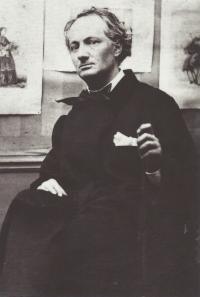
Tristesses de la lune
Ce soir, la lune rêve avec plus de paresse;
Ainsi qu’une beauté, sur de nombreux coussins,
Qui d’une main distraite et légère caresse
Avant de s’endormir le contour de ses seins,
Sur le dos satiné des molles avalanches,
Mourante, elle se livre aux longues pâmoisons,
Et promène ses yeux sur les visions blanches
Qui montent dans l’azur comme des floraisons.
Quand parfois sur ce globe, en sa langueur oisive,
Elle laisse filer une larme furtive,
Un poète pieux, ennemi du sommeil,
Dans le creux de sa main prend cette larme pâle,
Aux reflets irisés comme un fragment d’opale,
Et la met dans son coeur loin des yeux du soleil.
Charles Baudelaire
(1821-1867)
Tristesses de la lune
(poème)
• fleursdumal.nl magazine
More in: Archive A-B, Archive A-B, Baudelaire, Baudelaire, Charles

Matrijs voor herinneringen
Vermomder dan de dood is het zwijgen
achter vergelende vitrage. Van iedereen
die denkt van iemand iets te weten. Toch,
de eieren zijn bereids geraapt, beweegt
verleden wanneer het maar wil. Toen
mijn vader jong en klein was zwom hij
in de zee, wist hij niet dat ik dit schrijven
zou. Dat bedriegers gewoon zouden blijven
verzinnen. Konijnen zonder oren, meisjes
met kapotte poppen, dichters die geen
woorden kennen. Wel: water heeft geen
naam, en vluchtend wild zorgt voor later.
Bert Bevers
Eerder verschenen in Eigen terrein, Uitgeverij WEL, Bergen op Zoom, 2013. Bert Bevers is dichter en schrijver en woont en werkt in Antwerpen (Be).
• fleursdumal.nl magazine
More in: Archive A-B, Archive A-B, Bevers, Bert
 In Tomorrow’s Woman, Greta Bellamacina‘s bold, exploratory voice combines the vivid imagery of French surrealism and British romantic poetry with a modern, first-person examination of love, gender identity, motherhood, and social issues.
In Tomorrow’s Woman, Greta Bellamacina‘s bold, exploratory voice combines the vivid imagery of French surrealism and British romantic poetry with a modern, first-person examination of love, gender identity, motherhood, and social issues.
Andy Warhol’s Interview Magazine writes that “Bellamacina is garnering critical acclaim for her way with words and her ability to translate the classic poetic form into the contemporary creative landscape.”
Greta Bellamacina is an actress, filmmaker, and poet. She was born in London and made her acting debut in Harry Potter and the Goblet of Fire at the age of thirteen. She trained at RADA, where she performed a variety of lead theatre roles, before going on get a B.A. in English at King’s College London. Her feature film Hurt by Paradise is currently in post-production.
As a poet, Greta Bellamacina was shortlisted as Young Poet Laureate in 2014 for her debut collection, Kaleidoscope. In 2015, she edited On Love, a survey of contemporary British love poetry from Ted Hughes to the present. The same year, she published Perishing Tame, her first collection with New River Press, “a dazzling meditation on motherhood, female identity, ennui and love,” which she launched at The Shakespeare & Company in Paris.
In 2016, she published a collection of collaborative poetry with Robert Montgomery: Points for Time in the Sky, a pyschogeographical journey through modern Britain, and a rare example of collaborative poetry in British literature. The same year, she edited Smear, an anthology of contemporary feminist poetry. Dazed said the collection “unapologetically confronts self-image, body autonomy and our relationships with each other, celebrating the imperfect, frank woman.” In 2018, she was commissioned by the National Poetry Library to write a group of poems for their Odyssey series—modern mediations on Homer’s Odyssey.
Andy Warhol’s Interview magazine says Greta “is garnering critical acclaim for her way with words and her ability to translate the classic poetic form into the contemporary creative landscape.”
This is her first volume of her poetry to be released in the United States.
Greta Bellamacina
Tomorrow’s Woman
Paperback
112 pages
6 Feb. 2020
ISBN-13 : 978-1524854096
ISBN-10 : 1524854093
Publisher : Andrews McMeel Publishing
Product Dimensions : 14.22 x 0.76 x 20.83 cm
Reading level : 15 and up
Language: : English
£7.72
# more poetry
Greta Bellamacina
Tomorrow’s Woman
• fleursdumal.nl magazine
More in: - Book News, Archive A-B, Archive A-B, Art & Literature News, AUDIO, CINEMA, RADIO & TV, Bellamacina, Greta
Thank you for reading Fleurs du Mal - magazine for art & literature